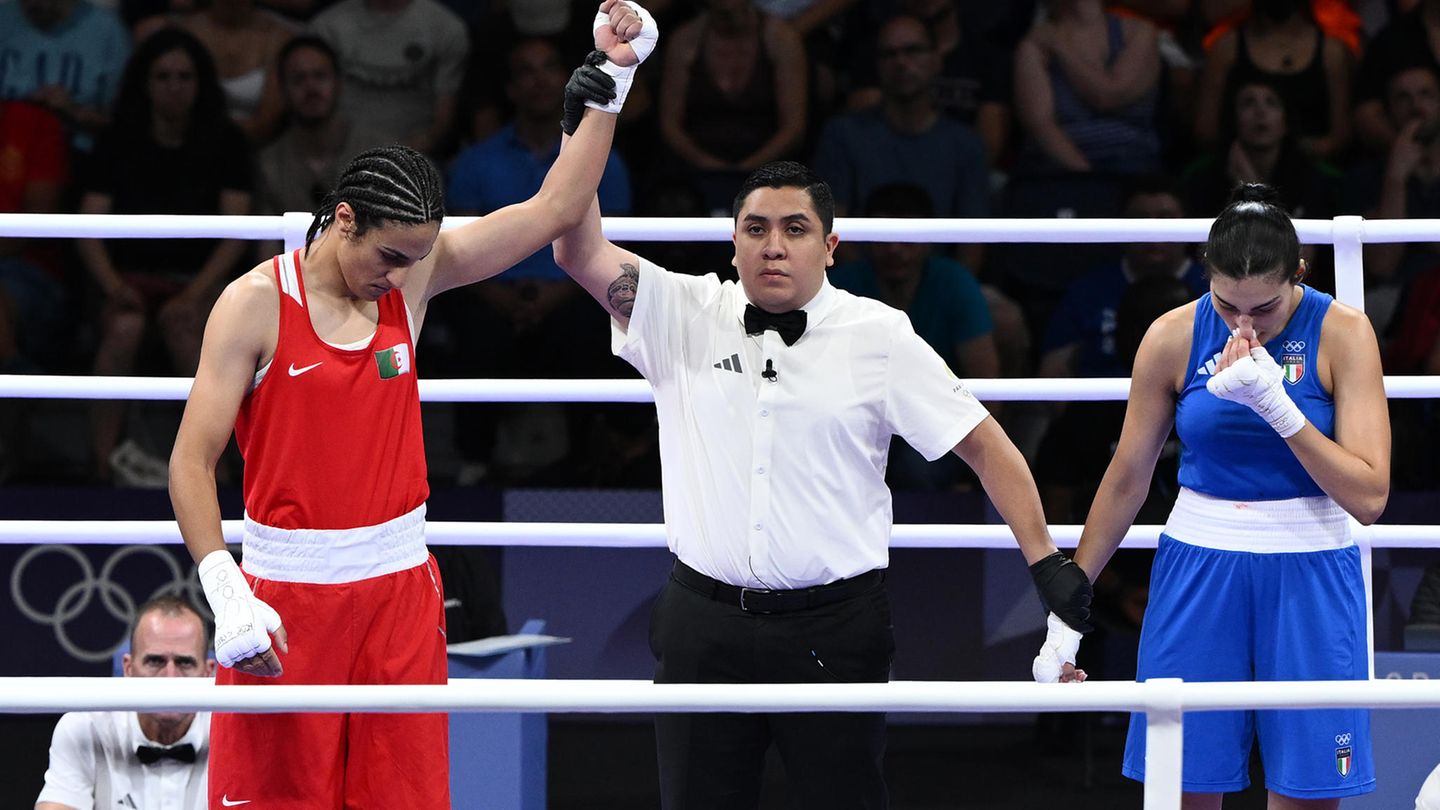46 seconds. That’s how long Imane Khelif’s last boxing match lasted. The boxer is now being criticized for it. We reveal what’s really behind it.
The Algerian boxer Imane Khelif won her round of 16 match at the Summer Games after just 46 seconds. Her Italian opponent Angela Carini complained of pain in her nose after a few punches and gave up. The handshake that is customary in boxing did not take place after the duel.
“For me, this is not a defeat,” the Italian said later. “I am a mature woman. The ring is my life. I have always acted very instinctively. And if I feel that something is not right, that does not mean that I give up. It is about having the maturity to stop. It is about having the maturity to say: ‘Okay, that’s enough.'”
The incident led to a major debate about the Algerian boxer’s participation in the Olympic Games. What exactly is it about? Who is the controversial boxer? And what is the truth behind the rumors that she is transgender? We answer the most important questions about the case at a glance.
Where does the criticism of the boxer come from?
Imane Khelif’s participation in the Olympic Games has been criticized primarily because she was retrospectively disqualified from the World Championships in New Delhi last year. The reason: people with XY chromosomes are not allowed to compete in the women’s event due to their physical advantages. In addition, her levels of the male sex hormone testosterone were found to be too high. However, the International Olympic Committee (IOC) is relying on a different set of rules and has allowed the boxer to compete in the women’s event, criticizing the decision at the World Championships as arbitrary.
Reason enough for numerous critics to question the Algerian’s victory. The accusation, which was voiced by Harry Potter author JK Rowling and Italian Prime Minister Giorgia Meloni, among others, was that a man was hitting a woman. “It is of course grotesque to claim that a person born as a man can have a body like a woman through hormones and operations. This tragic boxing match also proved this,” said feminist Alice Schwarzer in an interview with the “Neue Osnabrücker Zeitung”.
IOC spokesman Mark Adams defended the decision as follows: “They have competed in women’s competitions, they have won against women over the years and they have lost against women.” Each participant fulfills the eligibility requirements and the medical requirements.
Who is the boxer Imane Khelif?
Imane Khelif is 25 years old and grew up as a woman in Algeria. Inspired by the Olympic Games in 2016, she decided to pursue a career in boxing at the age of 17. Since then, she has already taken part in numerous competitions and is supported by her home country in her sports career.
The Algerian Olympic Committee has already commented on the criticism of the athlete: “These attempts at defamation based on lies are completely unfair, especially at a crucial moment when she is preparing for the Olympic Games, the pinnacle of her career.” The statement continued: “We are all behind you, Imane. The whole nation is behind you and is proud of your achievements.” Her greatest success so far was a silver medal at the World Championships in 2022.
What is the truth behind the trans rumors?
Imane Khelif is not transsexual. She grew up and was socialized as a girl and has competed in women’s competitions all her life. The fact that she has XY chromosomes and high testosterone levels has another cause: intersexuality. This means that a person has characteristics of both sexes, even if one of the two predominates in case of doubt. Khelif is therefore a woman with male sexual characteristics. A transition would be difficult for the athlete from a legal point of view. This is not possible under Algerian law. Transsexuality is not respected in the country.
Are there similar cases at the Olympics?
The Algerian boxer is not the only participant who has been criticized at this year’s Olympic Games due to genetic abnormalities. Taiwanese boxer Lin Yu-Ting was also disqualified from the 2023 World Cup in New Delhi, but will now compete at the Olympics. She will fight against Uzbek Sitori Turdibekova in the featherweight division. Zambia’s football captain Barbra Banda was also found to have too high a testosterone level during a test in 2022, but she and her team are now in the starting blocks for the Olympic Games.
Tolerance of genetic peculiarities has a long history at the Olympics. Other examples include South Africa’s 800-meter runner Caster Semenya. She says she has no uterus or fallopian tubes and has high testosterone levels, which she controlled with medication for years to become two-time world champion and three-time Olympic champion. Erik Schinegger became world champion in alpine downhill skiing in 1996 as Erika, but decided to undergo sex reassignment surgery after being diagnosed with the XY chromosome.
What happens next?
On Saturday, Khelif will face Hungarian Anna Luca Hamori in the quarterfinals. She has already spoken about the upcoming fight – and is diplomatic: “I’m not afraid. If he or she is a man, my victory will be even greater,” said the Hungarian.
Source: Stern
I am Pierce Boyd, a driven and ambitious professional working in the news industry. I have been writing for 24 Hours Worlds for over five years, specializing in sports section coverage. During my tenure at the publication, I have built an impressive portfolio of articles that has earned me a reputation as an experienced journalist and content creator.




